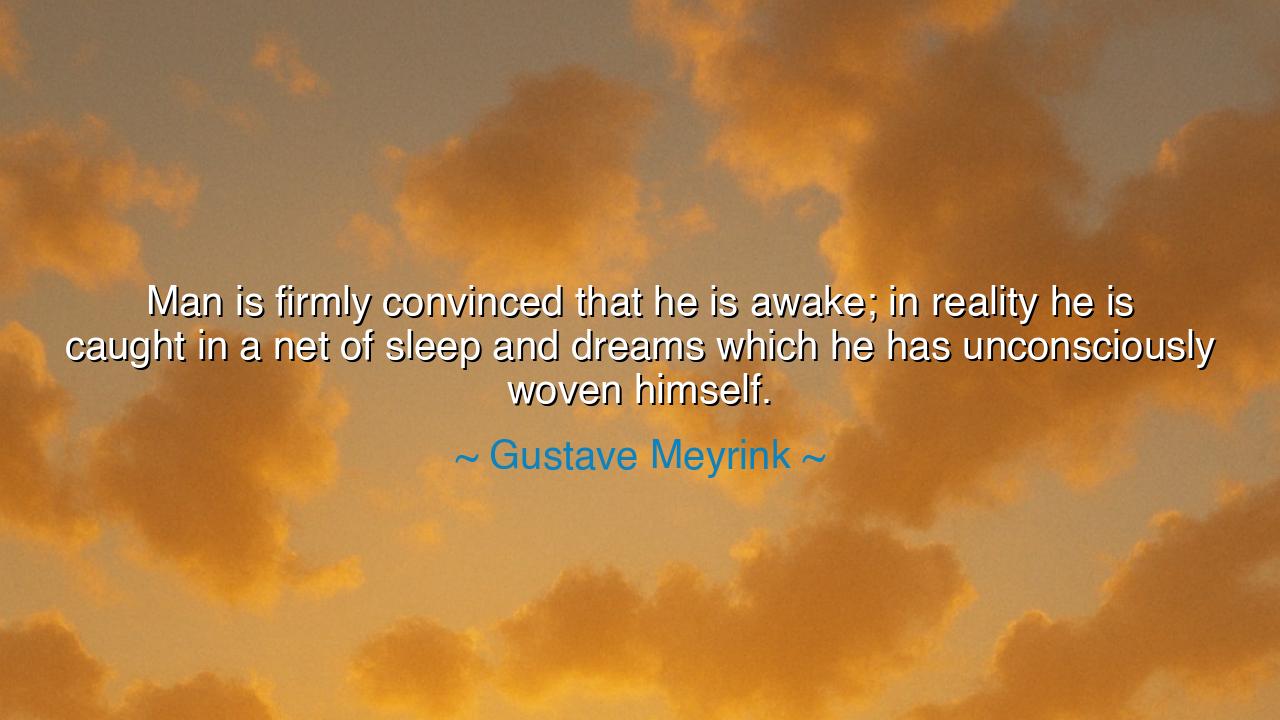
Man is firmly convinced that he is awake; in reality he is caught
Man is firmly convinced that he is awake; in reality he is caught in a net of sleep and dreams which he has unconsciously woven himself.






In the haunting and mystical words of Gustave Meyrink, novelist and visionary, we are offered a revelation that pierces the veil of ordinary life: “Man is firmly convinced that he is awake; in reality he is caught in a net of sleep and dreams which he has unconsciously woven himself.” These words are no idle metaphor. They speak to the ancient struggle between illusion and awakening, between the seeming clarity of the senses and the deeper blindness of the spirit. Meyrink, who walked the path between mysticism and art, reminds us that most men live their days as dreamers who believe they are awake — prisoners not of the world, but of their own minds, tangled in the invisible threads of habit, belief, and illusion they have spun through years of unawareness.
The origin of this quote lies in Meyrink’s own journey as both writer and mystic. Born in 1868, he was a man of intellect and imagination who delved deeply into occultism, spiritual philosophy, and esoteric thought. His most famous novel, The Golem, is not merely a story but an allegory of awakening — a vision of the soul’s struggle to pierce through the dreamlike state of existence. In his writings, Meyrink sought to reveal the hidden truth that the world we call “reality” is often a projection of our own inner confusion. His words draw upon ancient wisdom — from Buddhism, Hermeticism, and the Kabbalah — teachings which all proclaim that man, while believing himself conscious, remains lost in a sleep of illusion until he learns to see beyond appearances.
To say that man is caught in a net of dreams is to recognize the power of self-deception. Every thought we cling to, every fear we nurture, every desire we chase — these are the threads of the net. Over time, the dream grows thicker, and we mistake its patterns for the truth of existence. We live by routines, by borrowed beliefs, by emotions that rise and fall like waves, and call this “life.” But what Meyrink exposes is unsettling: that our supposed wakefulness is merely a deeper form of dreaming. We see only what we expect to see, hear only what confirms our beliefs, and call this “reality.” In truth, the walls of our world are built by our own perceptions, and until we question them, we remain asleep with open eyes.
History, too, has shown the price of this collective slumber. Consider the people of Rome, who once believed their empire eternal, even as it decayed beneath the weight of corruption and complacency. They were, as Meyrink would say, dreaming of greatness, while reality slipped quietly through their fingers. Or think of the countless times humanity has walked blindly into destruction — wars born of pride, oppression disguised as progress, faith twisted into fanaticism — each a dream mistaken for truth. Yet, amid this darkness, there have always been those who awakened: the prophets, the philosophers, the poets, who dared to tear through the net and speak of another reality — one born not of illusion, but of awareness.
To awaken, then, is no easy task. It demands that one see the dream for what it is — that one question not only the world, but the self. Meyrink’s words invite us to turn inward, to examine the dream-weaver within. Who built your fears? Who shaped your desires? Who taught you what to believe? When you begin to see that you are both the spider and the fly, the dreamer and the dream, the first threads of awakening begin to unravel. True awareness, as the sages teach, is not gained by acquiring knowledge, but by shedding illusion — by stripping away the false until only the real remains.
The lesson of Meyrink’s wisdom is both humbling and liberating. Do not assume you are awake simply because your eyes are open. Examine your life, your beliefs, your daily motions — how much of it is choice, and how much is habit? Cultivate awareness as the ancients did: through reflection, meditation, and the stilling of the restless mind. Seek to see not what you wish were true, but what is true, even if it shatters comfort. For only in that clarity does freedom begin. The man who awakens from illusion does not escape the world — he sees it anew, with eyes unclouded, and heart unbound.
So, my child of wonder and weariness, take heed of Gustave Meyrink’s warning. Do not be content with the dream of wakefulness. Look deeper. Ask yourself each day: Am I seeing the truth, or only the reflection of my own desires? Guard your thoughts, for they weave the net that ensnares you. But fear not the awakening — for though it may first appear as loss, it is in truth rebirth. When the net of sleep is torn, you will stand not as a dreamer lost in illusion, but as a soul awake, walking freely through the vast and living mystery of existence.






AAdministratorAdministrator
Welcome, honored guests. Please leave a comment, we will respond soon